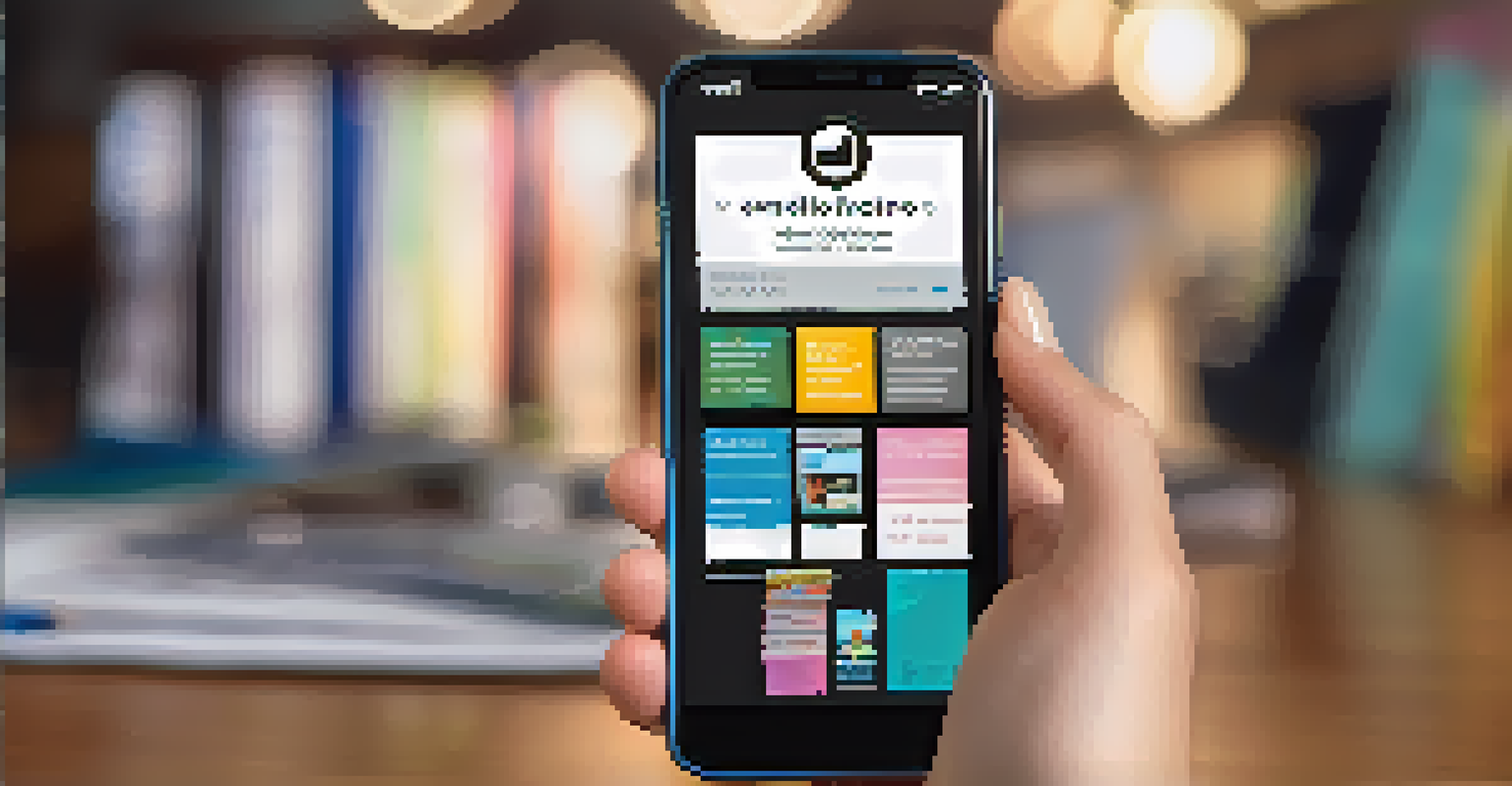Open Badges and Micro-Credentials: Enhancing Lifelong Learning

Understanding Open Badges and Their Importance
Open badges are digital representations of skills or achievements that individuals earn throughout their educational or professional journeys. They serve as visual proof of learning and can be easily shared online, making them a modern alternative to traditional certificates. This digital format not only enhances visibility but also adds credibility to the skills acquired, especially in a world increasingly driven by digital interactions and remote work.
Education is not the filling of a pail, but the lighting of a fire.
Imagine a badge as a trophy you can display on your digital shelf. Just like a trophy signifies your achievements in sports or academics, an open badge showcases your learning milestones. This visual aspect makes it easier for employers and peers to recognize your capabilities at a glance, making you stand out in competitive environments.
In essence, open badges provide a flexible and dynamic way to document learning and skills, catering to the diverse journeys of learners. They empower individuals to take ownership of their achievements and present them in a way that resonates with the digital age.
Micro-Credentials: A Flexible Approach to Learning
Micro-credentials are short, focused qualifications that allow learners to demonstrate specific skills or knowledge. Unlike traditional degrees, which can take years to obtain, micro-credentials can often be earned in just a few hours or days. This flexibility makes them particularly appealing to adults seeking to upskill or change careers without committing to a lengthy program.

Think of micro-credentials as bite-sized learning experiences. Just as you might grab a snack between meals, these credentials allow you to quickly gain knowledge in areas that interest you or are relevant to your career. They cater to the fast-paced nature of today’s workforce, ensuring that learning can happen on-the-go.
Open Badges Enhance Learning Visibility
Open badges provide a visual representation of skills and achievements, making it easier for individuals to showcase their learning milestones online.
By offering a variety of micro-credentials, educational institutions and organizations can meet the diverse needs of learners. This adaptability not only helps individuals stay competitive but also contributes to a culture of lifelong learning, where acquiring new skills becomes a continuous journey.
The Synergy Between Open Badges and Micro-Credentials
Open badges and micro-credentials work hand in hand to create a more robust learning ecosystem. When learners earn micro-credentials, they can showcase these achievements with digital badges, providing a visual and credible representation of their skills. This synergy enhances the value of both concepts, making learning more accessible and transparent.
The future belongs to those who believe in the beauty of their dreams.
For example, a professional might complete a short course in data analytics and receive a micro-credential. Along with this credential, they earn an open badge that they can display on platforms like LinkedIn. This combination not only highlights their new skill but also signals to potential employers their commitment to continued learning.
Together, open badges and micro-credentials foster a culture of recognition and validation. They encourage learners to pursue new knowledge and demonstrate their competencies in a way that is both meaningful and engaging.
Enhancing Employability Through Digital Recognition
In today's competitive job market, having a strong resume is essential, but showcasing skills through digital badges can set candidates apart. Employers increasingly value practical skills and demonstrable achievements over traditional qualifications, making open badges and micro-credentials invaluable tools for job seekers. This shift reflects a growing emphasis on competency-based hiring practices.
Imagine applying for a job and being able to present a digital portfolio featuring various badges that highlight your expertise. This visual representation not only makes your application more engaging but also provides potential employers with clear evidence of your capabilities. It’s like having a conversation starter right at your fingertips.
Micro-Credentials Foster Quick Learning
Micro-credentials offer flexible, bite-sized qualifications that enable learners to quickly gain relevant skills without lengthy commitments.
By integrating open badges into their hiring processes, companies can identify candidates who actively pursue learning and self-improvement. This trend encourages a workforce that is adaptable and continuously evolving, which is critical in an ever-changing job landscape.
Promoting Lifelong Learning and Skill Development
The concepts of open badges and micro-credentials inherently promote lifelong learning by encouraging individuals to continuously seek out new skills and knowledge. As the world evolves, so do the skills needed to succeed, and these tools make it easier for people to stay relevant. By breaking down learning into manageable and accessible chunks, they empower learners to take charge of their educational journeys.
Think of lifelong learning as a garden. Just as you tend to your garden by planting seeds and nurturing them, engaging with micro-credentials and earning open badges helps you cultivate your skills over time. This ongoing process fosters a mindset that values personal and professional growth.
Ultimately, the integration of open badges and micro-credentials into educational frameworks not only benefits individuals but also strengthens the entire workforce. It creates a culture where learning doesn’t stop after formal education, but rather becomes a lifelong pursuit.
The Role of Institutions in Supporting Badges and Credentials
Educational institutions play a crucial role in the adoption and promotion of open badges and micro-credentials. By integrating these systems into their curricula, they can provide students with more opportunities to showcase their skills in meaningful ways. This not only enhances the learning experience but also aligns educational outcomes with industry needs.
Imagine a university offering a series of micro-credentials in emerging fields like artificial intelligence or digital marketing. Students who complete these courses can earn badges that validate their knowledge and skills. This approach not only enhances the institution's reputation but also prepares graduates for the demands of the job market.
Lifelong Learning Through Digital Tools
The integration of open badges and micro-credentials promotes a culture of continuous learning, helping individuals stay relevant in an evolving job market.
Moreover, institutions can collaborate with employers to ensure that the skills taught are relevant and up-to-date. This partnership creates a bridge between education and industry, fostering a workforce that is equipped to meet contemporary challenges.
The Future of Learning With Open Badges and Micro-Credentials
As we look to the future, the landscape of education and professional development continues to evolve, with open badges and micro-credentials at the forefront. With technology advancing rapidly, the ability to validate skills through digital means will only become more important. This trend suggests a shift towards a more personalized and competency-based education system.
Picture a future where learning is entirely tailored to individual needs, with badges representing every skill you acquire along the way. This not only empowers learners but also provides employers with a clearer understanding of each candidate's qualifications, making hiring decisions more informed.

Ultimately, the growing acceptance of open badges and micro-credentials signals a positive change in how we value learning and achievements. As we embrace this new era, the focus on lifelong learning will continue to transform educational and professional landscapes, creating opportunities for everyone.